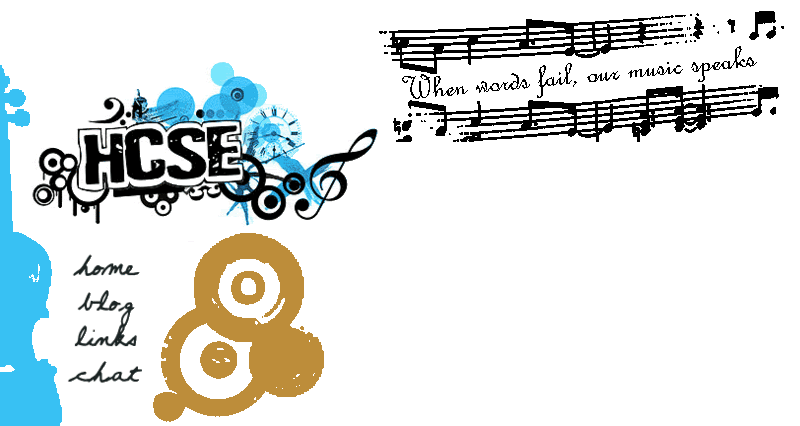I'm here to tell you guys that excessive mugging is terribly bad for your health. Mug in moderation always and do NOT overmug! Later we have dead zombies, although scoring full marks for GP, lumbering in for rehearsals O.O now how horrible would that be?
A recent study carried out by the economics exco, Hwa Chong Institution, Singapore, has determined that if everyone does not mug, then by game theory, everyone would benefit. Isn't that wonderful! Studying makes life boring. At least have some relaxation!
And today's form of relaxation is.... TADAHHH!.... JOKES! (zzz)
Regardless of whether you passed or failed your most recent test/exam, one should learn to enjoy the abundance of wonderful 'little things' that occur in our everyday lives. Put away your "Maclaurin's Series" notes or your "The Sargasso Sea" and jump right into these jokes O.O
Musical terminology jokes Part II
Gregorian chant: A way of singing in unison, invented by monks to hide snoring.
Half Step: The pace used by a cellist when carrying his instrument.
Harmonic Minor: A good music student.
Harmony: A corn-like food eaten by people with accents (see above for definition of accent).
Hemiola: A hereditary blood disease caused by chromatics.
Heroic Tenor: A singer who gets by on sheer nerve and tight clothing.
Hocket: The thing that fits into a crochet to produce a rackett.
Hurdy-gurdy: A truss for medieval percussionists who get Organistrum.
Interval: How long it takes you to find the right note. There are three kinds: Major Interval: a long time; Minor Interval: a few bars; Inverted Interval: when you have to back one bar and try again.
Intonation: Singing through one's nose. Considered highly desirable in the Middle Ages
Isorhythm: The individual process of relief when Vire is out of town.
Isorhythmic motet: When half of the ensemble got a different photocopy than the other half
Lai: What monks give up when they take their vows.
Lamentoso: With handkerchiefs.
Lasso: The 6th and 5th steps of a descending scale.
Lauda: The difference between shawms and krummhorns
Longa: The time between visits with Vire.
Major Triad: The name of the head of the Music Department. (Minor Triad: the name of the wife of the head of the Music Department.)
Mean-Tone Temperament: One's state of mind when everybody's trying to tune at the same time.
Messiah: An oratorio by Handel performed every Christmas by choirs that believe they are good enough, in cooperation with musicians who need the money.
etronome: A dwarf who lives in the city.
Minim: The time you spend with Vire when there is a long line. Breve: The time you spend when the line is short.
Minnesinger: A boy soprano or Mickey's girlfriend in the opera.
Modulation: "Nothing is bad in modulation."
Motet: Where you meet Vire if the cloister is guraded.
Musica ficta: When you lose your place and have to bluff till you find it again. Also known as 'faking'.
Neums: Renaissance midgets
Opus: A penguin in Kansas.
Orchestral suites: Naughty women who follow touring orchestras.
Ordo: The hero in Tolkien's "Lord of the Rings".
Organistrum: A job-related hazard for careless medieval percussionists, caused by getting one's tapper caught in the clapper.
Organum: You may not participate in the Lai without one.
Paralell organum: Everybody standing in a double line, waiting for Vire.
Pause: A short period in an individual voice in which there should be relative quiet. Useful when turning to the next page in the score, breathing, emptying the horn of salvia, coughing, etc. Is rarely heard in baroque music. Today, the minimum requirements for pauses in individual pieces are those of the Musicians' Union (usually one per bar, or 15 minutes per hour).
Pneumatic melisma: A bronchial disorder caused by hockets.
Prolation: Precautions taken before the Lai.
Quaver: Beginning viol class.
Rackett: Capped reeds class.
Recitative: A disease that Monteverdi had.
Rhythmic drone: The sound of many monks suffering with Crotchet.
Ritornello: An opera by Verdi.
Rota: An early Italian method of teaching music without score or parts.
Rubato: Expression used to describe irregular behaviour in a performer with sensations of angst in the mating period. Especially common amongst tenors.
Sancta: Clausula's husband.
Score: A pile of all the individual orchestral voices, transposed to C so that nobody else can understand anything. This is what conductors follow when they conduct, and it's assumed that they have studied it carefully. Very few conductors can read a score.
Sine proprietate: Cussing in church.
Solesme: The state of mind after a rough case of Crotchet.
Stops: Something Bach did not have on his organ.
Supertonic: Schweppes.
Tempo: This is where a headache begins.
Tempus imperfectum: Vire had to leave early.
Tempus perfectum: A good time was had by all.
Tone Cluster: A chordal orgy first discovered by a well-endowed woman pianist leaning forward for a page turn.
Transposition: An advanced recorder technique where you change from alto to soprano fingering (or vice-versa) in the middle of a piece.
Trill: The musical equivalent of an epileptic seizure.
Trope: A malevolent Neum.
Trotto: An early Italian form of Montezuma's Revenge.
Tutti: A lot of sackbuts.
Vibrato: The singer's equivalent of an epileptic seizure.
Vibrato: Used by singers to hide the fact that they are on the wrong pitch.
Virelai: A local woman known for her expertise in the Lai.
Virtuoso: A musician with very high morals.

